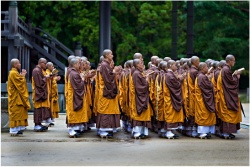Difference between revisions of "Three-month retreat"
| Line 1: | Line 1: | ||
[[File:31japan.jpg|thumb|250px|]] | [[File:31japan.jpg|thumb|250px|]] | ||
| + | |||
| + | |||
| + | |||
<poem> | <poem> | ||
[[three-month retreat]] | [[three-month retreat]] | ||
[[安居]] (Skt [[varsha]] or [[varshika]]; [[Pali]] [[vassa]]; Jpn [[ango]] ) | [[安居]] (Skt [[varsha]] or [[varshika]]; [[Pali]] [[vassa]]; Jpn [[ango]] ) | ||
| − | Also, [[rainy-season retreat]], [[summer retreat]], or [[tranquil]] dwelling.The period when [[Buddhist]] [[monks]] stopped their travels and outdoor [[activities]] for the duration of the summer [[rainy season]] and [[gathered]] at some sheltered location to devote themselves to study and discipline.The [[Sanskrit]] [[word]] [[varsha]] means "[[rain]]" and "raining," and [[varshika]] means "[[belonging to the rainy season]]" or "rainy." During the [[rainy season]] in summer in [[India]], [[monks]] [[traditionally]] dwelt in a {{Wiki|cave}} or a [[monastery]] for three months—from the sixteenth day of the fourth month to the fifteenth day of the seventh month.This was because the heavy rainfall made traveling and outdoor [[activities]] impractical, and to avoid trampling to [[death]] the small living things that emerged in the [[rain]], such as insects and worms.The [[tradition]] is said to have begun during the [[time]] of Shakyamuni.During this period the [[monks]] learned the [[Buddha's teachings]], engaged in [[meditation]] and other practices, and repented their errors.On the last day of the [[three-month retreat]], [[monks]] publicly confessed their transgressions of [[monastic]] discipline.This {{Wiki|custom}} was brought to [[China]] and Japan.In [[Japan]], the [[three-month retrea]]t was first observed in 683. | + | Also, [[rainy-season retreat]], [[summer retreat]], or [[tranquil]] dwelling.The period when [[Buddhist]] [[monks]] stopped their travels and outdoor [[activities]] for the duration of the summer [[rainy season]] and [[gathered]] at some sheltered location to devote themselves to study and [[discipline]]. |
| + | |||
| + | The [[Sanskrit]] [[word]] [[varsha]] means "[[rain]]" and "raining," and [[varshika]] means "[[belonging to the rainy season]]" or "rainy." | ||
| + | |||
| + | During the [[rainy season]] in summer in [[India]], [[monks]] [[traditionally]] dwelt in a {{Wiki|cave}} or a [[monastery]] for three months—from the sixteenth day of the fourth month to the fifteenth day of the seventh month. | ||
| + | |||
| + | This was because the heavy rainfall made traveling and outdoor [[activities]] impractical, and to avoid trampling to [[death]] the small living things that emerged in the [[rain]], such as {{Wiki|insects}} and worms.The [[tradition]] is said to have begun during the [[time]] of [[Shakyamuni]]. | ||
| + | |||
| + | During this period the [[monks]] learned the [[Buddha's teachings]], engaged in [[meditation]] and other practices, and repented their errors.On the last day of the [[three-month retreat]], [[monks]] publicly confessed their transgressions of [[monastic]] [[discipline]]. | ||
| + | |||
| + | This {{Wiki|custom}} was brought to [[China]] and Japan.In [[Japan]], the [[three-month retrea]]t was first observed in 683. | ||
</poem> | </poem> | ||
{{R}} | {{R}} | ||
Latest revision as of 18:01, 29 November 2015
three-month retreat
安居 (Skt varsha or varshika; Pali vassa; Jpn ango )
Also, rainy-season retreat, summer retreat, or tranquil dwelling.The period when Buddhist monks stopped their travels and outdoor activities for the duration of the summer rainy season and gathered at some sheltered location to devote themselves to study and discipline.
The Sanskrit word varsha means "rain" and "raining," and varshika means "belonging to the rainy season" or "rainy."
During the rainy season in summer in India, monks traditionally dwelt in a cave or a monastery for three months—from the sixteenth day of the fourth month to the fifteenth day of the seventh month.
This was because the heavy rainfall made traveling and outdoor activities impractical, and to avoid trampling to death the small living things that emerged in the rain, such as insects and worms.The tradition is said to have begun during the time of Shakyamuni.
During this period the monks learned the Buddha's teachings, engaged in meditation and other practices, and repented their errors.On the last day of the three-month retreat, monks publicly confessed their transgressions of monastic discipline.
This custom was brought to China and Japan.In Japan, the three-month retreat was first observed in 683.
